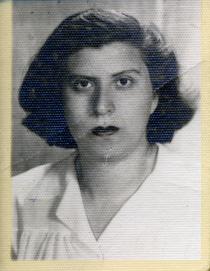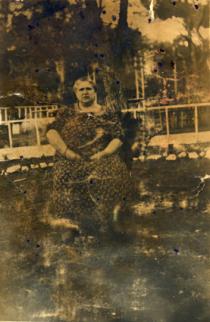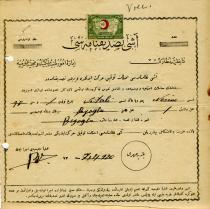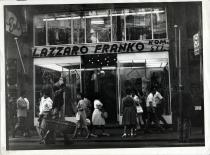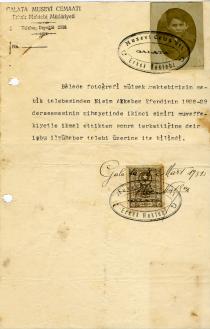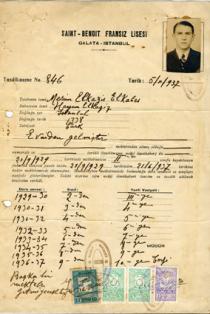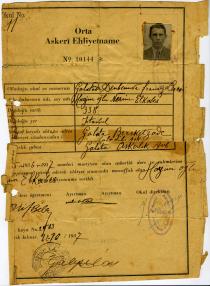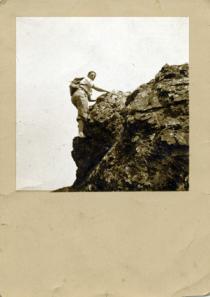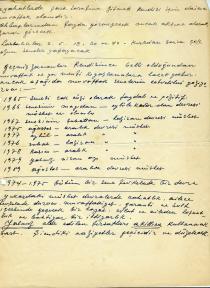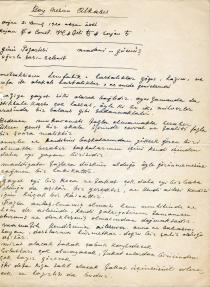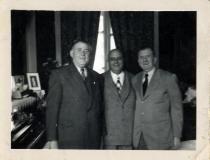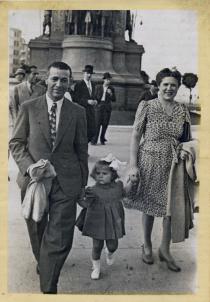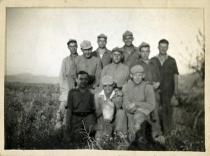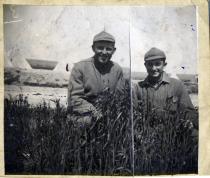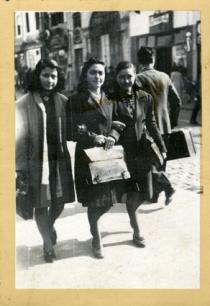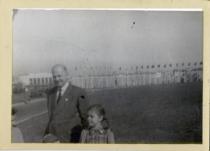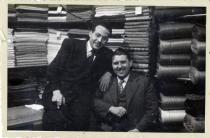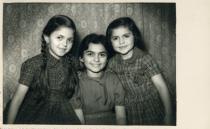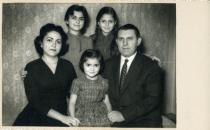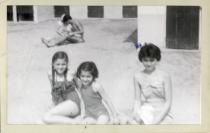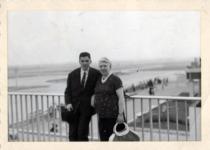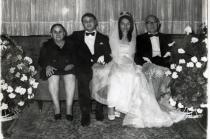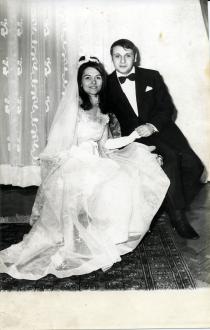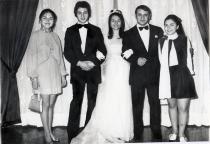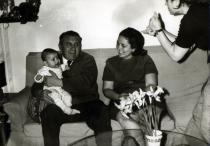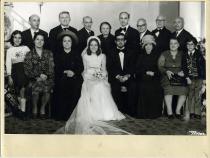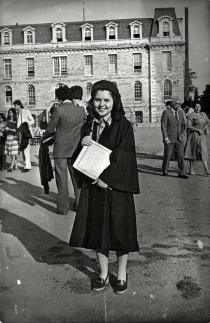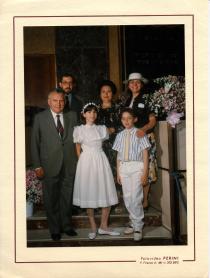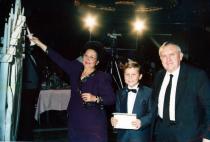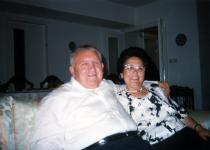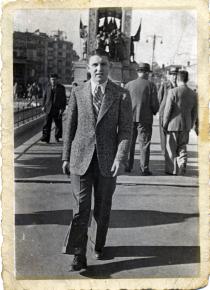
NESIM ALKABES
Istanbul,
Turkey
Interviewer: Meri Schild
Date of Interview: June 2005
When I went to interview my friend’s father, Nesim Alkabes, I had not met him; all I knew was that he liked to talk and had a lot to talk about. I went to their home in Levent [a neighborhood on the European side of Istanbul] situated in a new complex. He and his wife are very affable and pleasant people, I had a great time in their company. Nesim Bey (Mr. Nesim) is 1m70cm tall, with white hair and blue eyes, and a radiant face. The fact that he has trouble walking has not stopped his optimistic, happy nature, and he is full of jokes. He is slightly portly and is very hospitable. His spouse Erna Hanim (Mrs. Erna) is 1m60cm, tall, well-kept despite her age and radiant. Her features indicate that she was very beautiful when she was younger. Erna Hanim, like her spouse has a pleasant personality, is hospitable, and is a good cook as well as a good wife. This couple, Nesim and Erna Alkabes are representatives of an old Istanbul family. In their simply and tastefully decorated clean home, you are surrounded with a peace of mind. When you enter their home, the kitchen is situated on the left and a 25 square meter living room is situated across a not-so-small entrance hall. To the right of a short corridor, there is a medium sized bedroom, an office and a smaller bedroom. Even though the bedrooms are not large, they reflect the peace of mind of the occupants. Right across their bed is a large, color picture of their wedding day. They were both good-looking. Thinking that at the time people did not have the luxury of hairdressers and makeup, I realize that Mrs. Erna is as beautiful as an actress and Mr. Nesim is as handsome. The office is where Nesim Bey spends most of his day. Unfortunately he suffers from Parkinson's, and he spends his days reading geography books, consulting atlases, taking detailed notes on different countries as a mental exercise. According to him, he has covered 190 countries. He files the information on every country’s capital, surface area, population, gross products and the languages spoken. Nesim Bey enjoys studying books on Turkish and French History as well as geography. He follows the weekly Jewish newspaper, Shalom 1, takes notes on it, and pastes some of the articles and pictures on his walls.
My family background
My paternal grandfather was named Nesim Alkabes, grandmother Sinyoru Alkabes, and my maternal grandfather was named Hayim Vitali Alkabes Sisa. But I never met any of my grandparents, therefore I do not have any information on them. I only knew my maternal grandmother Ventura Sisa. (Unfortunately I do not know her maiden name.)
Ventura Sisa was born and raised in Hasköy; she was a tall brunette with dark eyes, and was a very cultured and helpful person. All Sephardic Jews conversed in Judeo-Espanyol [Ladino] 2 at home or among themselves then. In addition to that my grandmother was fluent in French and Hebrew (due to the fact that she studied at the Alliance Israelite 3 in Haskoy). That is all I remember about her, when I knew her she was already a widow and spent most of her time in our home. Unfortunately I do not remember when she died.
I do not know the education level of my paternal grandfather Nesim, who was very pious. He also conversed in Judeo-Espanyol like every Jew. He was born and raised in Balat [One of the neighborhoods on the European side where Jews lived] and owned a fabric store in the same neighborhood in a two-story brick building. At the time, there was no domestic fabric industry. My grandfather used to sell fabrics on the first floor, and ready-to-wear clothing (men’s pants and suits) on the second floor. In this store where my father took over eventually, fabrics imported from Czechoslovakia, Germany and England were sold between 7 and 9 liras per meter and the price was low for the superior quality of the merchandise. My grandfather also served as a volunteer usher (honorary) at the synagogue in Balat.
My father Hayim Vitali Alkabes was born in 1881, and grew up in Balat, on Leblebiciler street [a neighborhood on the European side of Istanbul]. (The fact that it was also Atatürk’s 4 birth year was a source of pride for him). He studied at the local Alliance Israelite Universelle school until he was 13. He learned to be fluent in French there. In addition he learned Hebrew and studied religion at home studying with a rabbi for 5 years.
When my father turned 15, my grandfather taught him to take over the job and he focused all his attention on the affairs of the Synagogue. In this way, my father became a merchant and had a business at a very young age. Since he was in charge of the business, he earned the money for his family, in other words my father would give my grandfather a monthly allowance for the family’s expenses. In this store, there were 2-3 employees helping my dad (I don’t know their responsibilities).
In 1918, my dad decided to expand the business and rented a 4-story building in Sultanhamam [the region on the European side where wholesale businesses are concentrated], across Hacipolo Han [owned by a Greek citizen where there were sellers of dry goods] along with three gentlemen named Zakuto, Galimidi, and Treves (because I was very young I do not remember their full names). In this way, they formed the company of “Vitali Alkabes Zakuto et Compagnie” [French for “Vitali Alkabes Zakuto and Company”] with four partners. My father had a 50% share, and the others 18%, 12% and 15%. On the first floor they sold fabrics, on the second floor men’s apparel, and the other two were reserved for manufacturing. When we say manufacturing, they would cut the pieces necessary for the ready-made clothing. But let me be clear here, there were no machines to do the cutting, all the fabrics were cut by hand. The cutting was done by our scissor-expert Nisim Nebabis. The fabrics that were cut by hand were given to outside workshops for tailoring. This was how the job was divided inside the store: My father was in charge of the fabrics, and Mr. Galimidi was in charge of the ready-made clothing. Mr. Zakuto and Mr. Treves helped Mr. Galimidi in the clothing business.
In those times different ethnic groups usually lived separately. For example, of the 50-60 thousand Greek citizens, half lived in Fener, most of the Jews lived in Balat and Ayvansaray, and the Muslims lived in Eyup. [These neighborhoods are on the European side and close to Balat]. I think my father had an affinity for learning and talking in foreign languages; he would converse in Greek as if it was his mother tongue even though he had no formal education, his Greek customers would mistake him as one of their own when he chatted with them. They would ask him: “Ines Romeos veya Ovreos?” [Greek for: “Are you Greek? or Jewish?”].
My father was one of the 36 best known fabric merchants, that is to say, we were considered wealthy. He was good at his job, he was very attentive and pleasant with customers, and he was a very good salesman (now they call it marketing expert); he would convince every person who entered the store to buy something. But he would never lie to them in order to sell merchandise, he would always tell the truth, in one word, he was an honest merchant.
Starting in 1935, Sümerbank 5 founded factories in Merinos, Hereke and Defterdar [different cities in Anatolia] and started “domestic fabric” manufacturing. After that date, importing fabrics became very expensive and we started selling domestic fabrics too.
My father had two sisters and two brothers. Ester (born in 1875) and Coya (born in 1878). I do not know their education levels. I only knew that Tante Coya [that’s how he called his aunt] married twice, got divorced both times because of financial problems, and because she did not have kids. My father, who was a very good and compassionate person would always host her in the house we grew up between Pesach and Shavuot.
My father’s other sister, Ester was fluent in French (unfortunately I do not know her education level), she was married to someone with the last name Gabay, I don’t remember his first name. He died on the field in the Turkish War of Independence 6. (I wasn’t even born yet, I don’t know many of the details). Tante Ester and her daughters Margorit (we called her Margo) and Ojeni became widows and my aunt who was a strong woman continued struggling through life. Tante Ester had both her daughters educated in Alliance Israelite, her daughters’ French was as good as their mother tongue. Margo worked at the Grand Rabbinate with Haribi Rafael Saban for 15 years. (He was our Grand Rabbi, the grandfather of Rıfat Saban, the lawyer). She married Sami Kazes and had a daughter named Coya. Coya is married to Selim Sages; they have a daughter and a son. (I don’t have any further information). Now they reside in Istanbul, in Gayrettepe [a neighborhood on the European side that was popular with Jews in the 1970’s]. Öjeni is married to an accountant, Rıfat Ventura and did not have children. Rıfat Bey made his living by being the accountant for 34 companies. Rıfat Ventura died around 1975, Öjeni around 1980, both are buried in the cemetery in Arnavutköy. Tante Coya died in 1959, Tante Ester in 1960. Both my aunts are buried in the cemetery in Kuzguncuk [a neighborhood on the Asian side of Istanbul].
My father had two brothers named Ishak (born in 1887) and Moiz (born in 1884). Uncle Ishak was born in 1887 and grew up in Hasköy [a neighborhood in the European side of Istanbul]. He studied in Balat [another popular Jewish neighborhood in the European side of Istanbul] in the Yeshiva. When my grandfather died my father took over to enable his brothers to get jobs. He opened a store for Uncle Ishak in Sultanhamam [the commercial district on the European side where wholesale goods are bought and sold] where he sold goods such as suits, pants and coats and in this way provided him [Uncle Ishak] with a job. Uncle Ishak was married to a lady who we called Tante Viktorya. (I don’t know a lot of details about this lady). As far as I know she spoke Judeo-Espanyol and of course Turkish. Unfortunately they did not produce children from this marriage. My Uncle Ishak died in 1963, he was buried in Kuzguncuk. A few years later, when his spouse passed away, we buried her next to my Uncle Ishak.
Uncle Moiz was born in 1884, like the rest of the family members, he also grew up in Hasköy. Because he studied in the Yeshiva in Balat he knew Hebrew very well. When he was around 23, 24 years of age, my father opened a store for him in Sultanhamam right across Uncle Ishak’s store, selling men’s suits and coats, just like he did for his other brother. This store was bigger compared to Uncle Ishak’s. Uncle Moiz was married to a lady named Rasel (Caldean). (Unfortunately I do not know her maiden name). They had three daughters and three sons. Their names according to their birth years were as follows: Ojeni (born in 1912) Ortans (born in 1915), Ester (born in 1919), (Liyaciko) Eliya (born in 1921), (Nisimiko) Niso (born in 1923) and Rifat (born in 1925). All three girls studied at Alliance Israelite.
Unfortunately Rasel died very young in 1943. After her mother’s death, one of the daughters, Ester took over her father’s care. My Uncle Moiz died in 1958, he was buried in Arnavutköy cemetery next to his wife.
Among my cousins, Eliya, we used to call him “Liyaciko”, studied in a Turkish school in Balat. However Liyaciko never liked his school and one day when he was 9, he ran away from school. The police were notified and they found Liyaciko in Silivri [It is one of the summer destinations on the European side now. Even now with all the highways that were built it takes 2 hours to get there from the center of Istanbul] and returned him to his family. I don’t know how he went there, the police brought us Liyaciko. Following this event, Uncle Moiz placed Liyaciko as an apprentice in my father’s store. In 1948 he married Ernesta Fresko, the sister of Sabetay Fresko who was a merchant of ready-made clothing in Sultanhamam, they had a girl and a boy (Mose). While everything was going well, he was stressed by the 6-7 September events 7 in 1955, and was feeling bad about the political climate when the brother of his spouse Ernesta who was settled in Milan said to him:
“My dear sister, we were very sorry to hear about the events in Istanbul. You can come here whenever you want, we will help you in any way we can” and Eliya took his whole family and moved to Milan. He opened a fabric store there and raised his family. Their daughter (I don’t remember her name) is an educator and currently works at a Jewish school in Italy. His son Mose is a gynecologist, I know that both his children are married, that he even has grandchildren, but because they are far away, I don’t have detailed information about them.
Unfortunately Liyaciko died in 1961, his spouse Ernesta in 1963; they are both buried in Italy.
My other cousin Niso, we used to call him Nisimiko, studied in Balat like his older brother, started working as an apprentice to a leather merchant at a very young age. In time he learned the trade and opened a store in Kapalicarsi [Covered Bazaar] 8 and became a leather merchant. He married Luiza (I don’t know her last name). They were very wealthy, they lived at Nisantas. [A neighborhood on the European side where the rich lived after the 1945’s]. They had two sons. Their children studied in Istanbul but I forgot the names of the schools. In 1965 Nisimiko passed away and was buried in Istanbul. His spouse Luiza had a brother who was settled in Panama. After her husband’s death, Luiza and her children went to stay with her brother and stayed there. Because the Spanish spoken in Panama is so similar to our Judeo-Espanyol, they did not have language problems. When they went there the sons were 32 and 33 years old, they earned their living doing import and export. Luiza is still alive. The children travel to Italy once in a while for business, so they have occasions to see their cousins. (One of my daughters Rosita lives in Italy.)
[I could not get information about Öjeni, Ortans, and Rıfat despite my insistence.]
My mother was one of four siblings.
My mother’s youngest brother Nesim Sisa (born in 1893) only went to school for three years (I don’t know where he studied) and was forced to start working at a very young age. Because of his hard-working, honest and enterprising personality, he learned the ropes of the business where he was apprenticed in a very short time and opened a 4-story store in Karaköy named “Galata Bonmarsesi". [One of the centers of commerce on the European side]. On the ground floor there were men’s shirts and shoes, second floor, men’s suits, coats and ready-made clothing, the third floor was manufacturing and the top floor was the warehouse. The back side of the top floor was next to the “Zülfaris Synagogue” [today it is the Jewish museum that was inaugurated by the 500.th Year Foundation] 9.
Nesim Sisa married Fortüne Aluf (I don’t know her birth date), a graduate of Alliance Israelite at the age of 23. His wife’s brother, Rafael Aluf was one of the famous stationary merchants of his time. In his store in Tahtakale, which was his own property, he would manufacture notebooks by importing paper [One of the important neighborhoods on the European side where today every kind of merchandise is sold wholesale]. Nesim and Fortüne lived in Sishane, in a flat in the family apartment “Aluf Han” a little further down from the Italian Synagogue. [One of the neighborhoods preferred by Jews on the European side]. Their marriage produced Elvir (born in 1921), Beki (born in 1923), Ester (born in 1925) and Meri (born in 1930), four daughters. All of them graduated from Saint Benoit. [French missionary school] [In those times this school was only until the end of junior high, so it was only eight years].
Beki, Ester and Meri married right after school. (Then it was very rare for girls to study a long time, when they had prospects, they would be married right away at 16-17 years of age). Only their oldest daughter Elvir studied in Robert College [today’s Bosphorus University] 10, because she studied in English, she knew it well. There, she met Sabetay Elvaşvili who was of Persian origin, dated him for 2 years and then got married at the Zulfaris Synagogue in 1945. They had a daughter named Rosita and a son whose name I cannot recall. Elvir’s husband Sabetay was also a good merchant. He would bring silk fabrics from Bursa. One of his customers reported him for cheating on the price. Sabetay and his family were deported to Diyarbakır in 1943 for 3 years. Still, both Sabetay, and Elvir were such warm and affable people that the mayor of Diyarbakır became their closest friend, every night their families would get together and play poker. From then on they were under the protection of the mayor. When their deportation period ended, they were forced to leave the country because of Sabetay’s Persian nationality and in 1946 moved to Israel, where they raised their children. In 1950, on a spring day, when their son was 2 and their daughter 3, Sabetay climbed a tree to pick a fruit that his daughter Rosita had seen and desired, and just as he was about to pick it, lost his balance and fell. As a result of the fall, he was badly injured and contracted tetanus. His body did not respond to the therapy and unfortunately he died 3 months later (I don’t remember the year). Elvir married an Iraqi Jew 6 months after his death and they still live in Israel.
Beki married Vitali Illel after graduating from St. Benoit at the age of 18. (I don’t know the education level of Vitali) At Marputçular [A neighborhood on the European side where commerce is prevalent] he would sell “Boneterie” (men’s shirts). His father-in-law (Beki’s dad) was his son-in-law’s best customer. They had two sons (I don’t know the names). One of them moved to Italy. The reason was that this son who had followed in his father’s footsteps in the business did not make it, because he could not pay his debts, he took his family with him and started a new life in Italy. I don’t have much information about this person. Their other son stayed in Istanbul. He has mental problems, he has always been a burden to his family. I don’t know why he has always been depressed. I don’t know where he is now...
The daughter of Nisim Sisa, Ester also studied in St. Benoit. She married Albert Baruh in 1955 at the Zulfaris Synagogue. He was in import and export, they moved to Israel in 1960. They had 2 sons. They are both still alive.
Nisim Sisa’s other daughter, Meri also studied in St. Benoit like the other members of the family. She married a thread manufacturer Momo Levi in 1960. They had a daughter. This girl married a Muslim gentleman and had three daughters. Momo unfortunately died in 1990 and was interned at the Arnavutköy cemetery. Meri still lives in her flat in Macka (one of the best neighborhoods on the European side). My uncle Nisim’s spouse Fortüne Sisa died in Istanbul in 1980 and is buried at the Arnavutköy cemetery. After his wife’s death, my uncle Nisim who had been suffering from diabetes for a long time went to London thinking he would get better care and unfortunately died there. His family brought his body back to Istanbul and buried him next to their deceased mother.
Turkey (consequently also Istanbul) was being governed by occupying countries during the 1910s and the English and French governments would give a certificate called “Protégés Orientaux” to every person leaving the country; [these certificates would be considered that person’s passport]. My mother’s two other brothers Albert and Vitali Sisa (I don’t know their birthdates] did not want to live here [Istanbul] and in 1918 went to France to try their luck and settled there. After they left, they were forbidden to reenter Turkey because they did not have a Turkish passport. Both brothers lived in France as “Protégés Orientaux”. They did not have any papers to prove they were Turks. In time Vitali became sales manager for the firm he had been working for and married a lady from Strasbourg, they had two daughters. He died around 1975 and was interned there. Because they were far from Istanbul, I did not know this family, I do not have much information.
His brother Albert became the night guard for a store, [now it is called “Security” personnel] he also married a French Jewish lady, they had a daughter named Elvira. In 1950 the Turkish president Celal Bayar 11 declared a pardon for Turkish citizens living abroad as “Protégés Orientaux”, and allowed them to visit their country for 3 months every year. Alber took advantage of this pardon and came to Istanbul with his daughter, we met and took them around with my family. I will never forget, one Sunday I took my wife, my 3 daughters and my 2 guests to a place with live music; “Beyaz Kelebekler (White Butterflies), Henny Vasilaki” who was famous at the time, were playing, the table was filled with “filikas” [a type of cheesy börek made with phyllo dough], haydari [made with yoghurt, garlic and mint], kroket and mezes of different kinds, I had paid 30 liras for 6 people for the food, drinks, fruit and coffee we consumed (this could have paid for one month’s rent). After this visit we did not have a chance to meet again, but we kept in touch by corresponding on every occasion. Albert who died in 1983 is buried in France. His daughter Elvir worked for the French municipality for long years, I think she retired and now lives around Versailles. I don’t have any information about Albert’s wife.
My mother Sara Merkada was born in 1891 and raised in Hasköy. [A neighborhood on the European side]. She first attended the preschool in the English school in Hasköy (at that time it wasn’t usual for girls to attend school in a lot of families) and unfortunately attended school only 2 years. Her father who owned a grocery store said: “You studied for two years, that is enough for you” and removed his daughter from school and kept her at home to help her mother. Apart from Judeo-Espanyol, the only foreign words my mom knew was to count up to 100 in English.
The fathers of my parents knew each other from the business community; they arranged for the marriage of the young couple while talking to each other one day. When they met, my mother was 17 years old, with a height of 1.80 cm. and a weight of 115 kg., and my father was 27 years old with a height of 1.55 cm., and a weight of 65 kg. None of these contradictions prevented their marriage. They had 11 children but only 6 survived. Öjeni (Surjon 1911), Ester (Krespi 1915), Elvir (Alkabes 1917), me Nesim (1920), Eli (1923), Albert (1926). These were our birthdates and we struggled through life. Our other 5 siblings died (I don’t know the cause of their deaths, maybe they were premature etc., my mother never talked about this, anyways we were very young).
My father was very authoritarian despite having a small frame, my mother on the other hand, was very easy-going, very respectful towards her spouse, she was someone who had dedicated her life to her family. Because my mother was 10 years younger than my father, he was the boss in the house. My father loved us a lot even though he was authoritarian and would do everything we asked as much as he could. Still, on the Sabbath, we would keep our distance from him and never demand anything. That’s because my father normally smoked 1,5 packs of cigarettes a day, and on the Sabbath, refrained because of his faith and would be very cranky. My father was a religious man and my mother would carry out the religious obligations as much as she could in deference to him. Even though my mother was religious she would not wear a wig, she would only use a scarf when she was out on the street. Because we were raised in a religious household, we still live and perform according to our religious beliefs.
In our house, my mom, my dad, 6 children, our maid Fatma, who was the wife of a policeman and my father’s widowed aunt “Tia Hursulachi” (that’s how we called our great-aunt) lived all together. Because there were a lot of us, my mother was very busy; my mom, my aunt and my grandmother, who spent most of the year with us spent almost all their day in the kitchen. That is why my mother left the house only once every two weeks, because she was overweight, (I could call her “obese”, apparently she was fat since she was a child) my father would take her with a horse-carriage even to a distance of 200 m. (We used to live on Istiklal Caddesi then, instead of vehicles, there were horse-carriages “Fayton” [A comfortable wooden carriage pulled by one or two horses, with a maximum capacity of 4 passengers]. Someone had to get on the horse-carriage before my mom every time, otherwise the carriage would tip off balance and fall on its side. Other than horse-carriages there were trams for public transportation “Tramvay”. There were two categories of trams: the green one cost 5 kurus, the one we called first class and which was red, cost 8 kurus. There were only 5 to 10 taxis. My mother could not take the tram or the taxi. My father enjoyed life, along with my mother, they would frequently go to “Londra Bar” (London Bar) on Istiklal Caddesi. He liked to drink raki 12. They would drink, eat appetizers, and listen to music. When I grew up, occasionally I would join them (there were 8-9 ladies who had beautiful voices and who would sing traditional Turkish music).
My father did not quit smoking while alive. Even though our doctor Sinay said to my father: “Mr. Vitali you will die, please quit smoking”, he kept at it without giving up and died in 1965 at the age of 81 due to heart failure. Because he was from Kuzguncuk we interned him in the Kuzguncuk cemetery. (I forgot the first name of the doctor).
Growing Up
I, Nesim Alkabes, was born on July 21st, 1920 in our brick home that was 30 m. further from Galata Kulesi [the Galata Tower: a neighborhood on the European side where Jews congregated in the beginning of the 20th century] with the help of a midwife. All my other siblings were born in this house like me. My father had bought this house with his savings. We lived on one flat and rented out the other 3 flats. We lived there between 1920-1928. As far as I remember, it was not a big house. The entrance opened up to a hallway, at the end of it was the bedroom of my maternal grandmother, but it was such a small room that she did not have a bed, she would make one for herself every night on the floor. We had a closet we called “Yükli” in this room. We would put items such as mattresses, comforters in there. The system of sleeping on a floor bed worked for all of us, we all slept on the floor. We warmed the house with a coal-burning stove as well as a Belgian stove called “Salamandra” where you would feed it coal from the top and remove the ashes from the bottom. The maid lit these stoves. In the bathroom of this house, there was a shower boat, we didn’t have a tub, and once a month, in accordance with the rules of kashrut, we would go to a hamam in Kasimpasa together with all the ladies of the house (because I was still young). We would go there with a horse-carriage, this was a big event for us (paseo). The men would go to “Galatasaray Hamami” every Friday.
My father always preferred investing in real estate. Accordingly, he bought a 3-story, 8 bedroom wooden house in Galatasaray (on Kaleci Kulluk Street) [A neighborhood on the European side]. This was a neighborhood preferred by Greeks. He rented out the bedrooms in this house for 8 liras a month to either divorced or widowed Greek ladies, in this way he helped them out a bit. These apartments would share the kitchen and bathrooms on each floor.
Until the 10th anniversary of the [Turkish] republic, Friday was the official rest day of the week. After 1933, it was changed to Sundays. The reason for the change in days was that everywhere in the world Sunday was the official holiday. The fact that we had Friday as the holiday was affecting the stock market and the economy suffered as a result.
My first school was where the Neve Shalom Synagogue 13 is located now [A neighborhood called Sishane that Jews preferred at the beginning of the century]. We had a synagogue called Knesset there, below the Synagogue we had our Jewish primary school. After I studied for 3 years in this school, I went to Saint Benoit for junior high and graduated. When I was only 8, my father provided me with 5 years of religious education in the form of two hours twice weekly from Rabbi Gabay who came to our house, just as his father had done for him. My father was very wealthy; we would pay the Rabbi 2 liras a day, sugar cost 28 kurus. The cost was decided by Atatürk then. “Bu iki lira babama bir bardak su gibi gelirdi” “These two liras were like a glass of water for my father” [this is his saying]. As result when I celebrated my bar-mitzvah, my Hebrew and knowledge of the Torah was excellent. We celebrated my bar-mitzvah ceremony by inviting three priests from my school and our relatives to our house on a Sunday.
The home I remember most was in Beyoglu [a neighborhood on the European side on a street called Rue de Péra where people would dress up to walk around or to shop] the 4th story of “Meymenet Han” which was located on the corner of the hill where today stands the Palais de France. On the ground floor of this apartment we had a store called “Bazar de Bébé” where they sold children’s clothing. Because our apartment was located in a corner where the main street and the side street met, there was a lot of light and space. It was 200 square meters, and in the living room, out of 8 windows, 5 looked out on Istiklal Caddesi and 3 to the side street [today it is called Nuri Ziya Sokagı]. Next to the living room we had a room called “Fumoir” [french for “smoking room”], which was quite large. Whenever we had guests, my sisters’ girl and boyfriends, my father’s friends or our relatives, smoking was allowed only in this room; in addition we had a gramophone in this room and we would play waltzes, tangos etc. with what were called “stone records” that were produced by “Sahibinin Sesi” and that we had bought for 2 liras (we could buy 6 kg. of sugar with this money, a kg of sugar was 28 kurus, bread was 8 kurus).
Other than our dance parties there were nights when we hosted dinner parties, other than the Sabbath or the holidays. As you can imagine our nights were very lively in our home. My father’s sisters Tante Coya, her two daughters and Tante Sarina would come to visit two to three days a week, we were a large family; twice a day the butcher Dalva (Someone who sold kosher meat in Shishane) would stop by and take orders. My aunts also placed their orders and always my father would take care of the bill.
We had beds in this house for the first time. Our system of sleeping in this house was like this: My three sisters in one bedroom, in the other us three boys, in the master bedroom my mom and dad with their own bathroom [parents’ bathroom]; (my father would take a shower every morning before he left the house even then). We had another bathroom other than the parents’, and in yet another bedroom our aunt (we used to call her Tiya Hursulachi) and our maid Fatma hanim slept. My father was a very humane, family-oriented person. He took in our widowed aunt who was desperate after her husband’s death. We called her “Tiya” [Ladino for “aunt”], she spent the last 8 years of her life with us; she was very pious and unfortunately we found her dead the morning of a Shavuot day in her bed, we interned her next to her husband as our religion dictates. My Tiya loved me and protected me so much that she was like my personal attorney.
Our home was one of the modern ones of the time, we had electricity and running water. Our house was heated by two Salamandra stoves located in the hallway and the living room (it was harder to keep warm than a coal-burning stove because it was much larger and we had to remove the ashes of the coal that was put from the top, from the drawer located in the bottom and add coal again before it went out) and a Chinese stove in the dining-room. The job of Fatma Hanim was really hard in winter, thanks to her, the rooms we lived in were always warm. Our bedrooms though were cold, on snowy days our father would put rugs on top of our comforters. We would heat water by burning logs on a stove-type apparatus. The stoves in the kitchen worked by gas piped into buildings. We have always had Muslim household help. Only, when I was 18, we had a 15-year-old helper named Fortüne from Bursa. My first life experience was with this girl. When, 3 months later, my mom became aware of the situation, it was the end of my first love affair. After that day we never again had a non-Muslim helper.
We would bathe on Fridays because it was “Shabbat”, we would give the Sabbath bride its due. As I said, because my family was religious we tried to live accordingly. On Saturdays, there was no cooking or showering. All the food was prepared by my mom and Tia Hursulachi, starting on Thursday and mostly on Friday. We did not have pressure cookers then, our Sabbath meal was prepared with two days’ labor (today usually most of the meals are cooked in pressure cookers by Sephardic ladies). In this way we would rest on Saturday. On our return from the synagogue we would eat “Biskochikos [a kind of cookie] prepared by my mom and drink hoshaf (stewed fruit juice) [prepared the day before].
Because my father was the oldest and the partner with the largest share, the other partners and their spouses, the accountants (one was Mr. Bohor, I don’t remember the name of the other) and their spouses, their friends, the secretary in the office, Mlle. Margo, all came to our house on the holidays. Mlle. Margo later became the long-term secretary to the Grand Rabbi “Harbi Rafael Saban” who was very open-minded, and receptive to reform and change. (I don’t remember who was the Grand Rabbi before Rafael Saban, following him it was Rav. Asseo for 41 years). Margo married Sami Kazez when she was 30. They would always come to our house for the holidays (Passover, Shavuot, Sukkot), they would greet my mom and dad and chat. Normally on a Passover night we were 10 for the seder, with my father’s sisters Tant Coya, her two daughters, Tant Sarina (Ester) and our secretary Mlle Margo, we would be 14 at the table.
The rent for this house was 120 liras. (As I said before, my father was so wealthy that this rent money was similar to drinking a cup of sea water) (At the time a captain’s salary was 90 liras). My father was very extravagant; after we rented the house, he brought two painters from Italy. He had them decorate my sisters’ bedroom with pink flowers, the boys’ bedroom with blue flowers and his room with flowers of different colors.
Even though we had hot water and a bath tub in the house, the ladies still went to Galatasaray Hamam on specific days of the month. My dad and us boys did not have such specific days to go to the Hamam. Even though the Hamam was so close to the house my mom was so overweight that she had to go there with a horse-carriage.
The story about Fatma Hanım who lived in our house and helped my mom with housework was as follows. My father had a very good customer in Gönen [A town near Balikesir on the Marmara Sea] whom he gave merchandise to. The farmer brother of this customer had married his daughter to a policeman working in Istanbul Aksaray Karakolu [A neighborhood on the European side]. But this uncle police had to sleep in the police station every night except Wednesdays, so to help with the household budget they could place her in a dependable home as a live-in. My dad explained this offer to my mom and they accepted; and Fatma came to live with us. Her husband would come every Wednesday evening to pick her up and bring her back Thursday morning. They were such conservative people that Fatma never left the house other than on Wednesdays. Fatma lived with us for 8 years. One day when her husband said: “I am sorry, I have become a sergeant, I want my wife to live with me”, Fatma left us.
At home we would all sit around in comfortable pyjamas, neither my mom, nor my dad had special clothing that they wore at home. Because the house wasn’t very warm, we would wear jackets called “Coin de feu” (short jackets made from sheltand fabric). The girls wore long robes made again from sheltand.
Of course when the family started growing and the fiancees would visit we could no longer wear pyjamas. For example, my wife Erna has never seen my dad like that, my father was always in a suit and tie.
When we lived in this house I was about 8 years old and was studying in Saint Benoit junior high school [A French school on the European side where girls studied until 8th grade and boys studied until end of high school]. Before St. Benoit, I went to the school beneath Neve Shalom, there the curriculum was Turkish. My father wished that I learn French so he enrolled me at St. Benoit. Before I started I took a test and enrolled in the second grade of “Petit College” [The name given to the primary school department of this school]. In this school we only had 3 hours of Turkish classes a week, these were History, Geography and Turkish, the rest of our classes were in French. At the time report cards were given every weekend. I was a very good student, my grades would change between 16 and 18, out of 20. In our class of 32, I ranked 4th in general, and 1st in math. Our French principal would say: “Vous êtes dans le bon chemin mon petit, continuez” [you are on the right path my little one, continue].
I would bring this report card home and my dad would sign it with a lot of pride.
What a nice coincidence that today we reside in the same apartment as my class teacher, Mademoiselle Palensya (of course she is quite old now, she lives here with her son. We meet from time to time and reminisce).
As I said before, in this place we had our synagogue which we called Knesset and beneath it our primary school. There were only 40, 50 children left and most of them started getting their education in other schools rather than the Jewish school. The Grand Rabbi of the time, Rav Harbi Rafael went to see our president Celal Bayar and requested a bigger synagogue for the Jews because our population was growing. As a result of this initiative, the Neve Shalom Synagogue 13 was built.
In this apartment our downstairs neighbor was the fabric merchant David Anjel and his family, upstairs neighbor was M.Ü. Mayer, who was one of the famous brokers of the time and imported fabrics and ready-made-clothing from Europe. (I do not know what M.Ü. stands for, that was his name). My father would sell fabrics in his store that this gentleman imported.
Our second home was on the first floor of Dilber Han in Tozkoparan. This building was built by someone named Benardete who was an importer in Canakkale. We rented a flat on this 6-story, 12 unit building. Our rent went down to 42 liras when it was 120 liras for our home on Istiklal Caddesi. When you entered the house first you entered a hall, and that would open into the living and sitting rooms. In the back there were 7 bedrooms. We had to feed logs into the stove to get hot water in the bathroom. The heating of the house was also with a stove in winter. We had electricity and running water.
During those years my father was still a partner in the company “Vitali Alkabes Zakuto et Compagnie”. The business continued until 1932. The effects of the recession that happened in the U.S.A. during 1929- 1930 started affecting Istanbul in 1931. The I O Us (I owe you) started returning without being paid. My father had signed these I O Us and had to pay the value on them. My dad was continually trying to pay his debts.
At the time, as a result of a proposition from France for my oldest sister Ojeni who was born in 1911, my mom, dad and sister left for France in the summer of 1932 for what they thought was a 15-20 day trip. Their trip to France proved to be quite difficult. First they took the boat named Stella Moris to Marseilles which lasted 8 days and then from there took the train to Paris. This voyage coincided with a period named “Shiva Avsarmeta” (the three weeks of mourning) unbeknownst to them. They were able to come back 2 months later. During those weeks, there can be no marriages by the Rabbinate, no house buying, no new clothes and no moving into a new home. They were there and had nothing to do, so they stayed in a hotel for 2 months, married my sister and returned. My sister’s wedding was done in a hotel (just like in Israel, the rabbi came to the hotel). The ceremony wasn’t done in the synagogue (my brother-in-law was an atheist, maybe that’s why it did not take place in a temple, I am thinking that he must have accepted being married by a rabbi out of respect for my father), in the evening, after a family dinner for 90 people, my mom and dad returned to Istanbul again on the boat named Stella Morris after an 8-day voyage.
When my father returned after this long break, he saw that the ripple effects of the American recession had spread all over Turkey. One of his partners in the store had passed away and the others had pulled back their capital when they realized they could not meet their debts. The store was on the edge of bankruptcy. My father got very upset and said: “When I was away for two months what did you do this place? How could you not pay the debts?” “If we had paid the debts, we would be penniless, our kids would starve. We did not have a choice. This economic crisis has brought down all of us” they replied and annulled their partnership. My father was obliged to give up our store. My father had a lot of investments. He paid all of our debts by selling each flat in our 4-story house in Kuledibi for 12,000 liras (for a total of 48,000 liras) and another flat in Galatasaray for 8,000 liras. [Neighborhoods on the European side where Jews live together].
One day, when I was still 17 years old, my father said to me: “My dear son, you are the oldest of my three boys, I am already 56 years old and very tired; you finished junior high and learned French well, you are almost a genius in math, you took accounting lessons, you also speak Spanish, you are well educated, from now on please come and help me." “But daddy, what are you saying? I want to study law” I replied but I could not defy my father and started in business.
With the money he got my father opened a new store in Mahmutpasa, on Rızapasa Yokuşu (Hill) [One of the oldest neighborhoods on the European side where wholesale commerce is done]. It was a fabric store and the first ones he sold were the leftovers from the old store. My father had such an honorable reputation in the fabric industry that the merchants who imported merchandise from England would prepare the bills and give them to us as consignment. We would sell these fabrics, calculate our money and make our payments within 1 to 1,5 months. There was no domestic manufacture of fabrics in Turkey, all of Anatolia would buy foreign fabrics from Istanbul, our business was doing well because supply and demand was quite high. In this store and in the old business, Rafael Levi and my cousin Eliya worked with us. Customers from outside Istanbul would come to our store to choose merchandise. We would pack these, warehouse them in Sirkeci [A neighborhood on the European side] and in the evenings truck them and send them to their destinations. I started working in the store when I was 17, I was in charge of accounting and the customers. My brother-in-law Henri’s (In Judeo-Espanyol we called him Haskiya, the husband of my sister Öjeni) father Nisim Surjon was sent as an ambassador to Italy by Padisah (Sultan) Abdülhamit 14. Nisim Bey (Mr. Nisim) did not get along with his wife, she settled in France in the 20th. arrondissement [neighborhood]. At the time their son Henri was studying in Galatasaray Lisesi (highschool). It was a boarding school, when he graduated he tried to go to France to get a law degree but the Turkish bureaucracy did not give him a passport. That’s because Istanbul was occupied by the French and British then. Henri applied to them, and got the “Protégé orientaux” certificate and left for France, but the Turks rescinded his Turkish nationality. How unfortunate that the French also did not accept him as French. My brother-in-law finished his law degree with this certificate and married my sister Öjeni in 1932.
My father had transferred 20,000 Turkish liras to France as a dowry for my sister. With this money, the young couple opened the store “Bonneterie” on Rue des Pyrenees. My sister would stay at the store and my brother-in-law would go to adjacent cities to buy merchandise and take orders. The pleasant days unfortunately were short-lived because the world was on the edge of a new war.
During the second world war when the Germans invaded France, they could not touch my sister when she said “I am a Turkish citizen." The Nazi hunters were after Jews like everywhere else in the world. The staff of the police station where my sister lived would learn that the Germans were coming to look, beforehand, and warned all the Jews. Because my brother-in-law Henri was neither Turkish nor French nationality, he would escape to the nearest villages when he heard. He would hide for a few days and then return home. My sister’s store was open for business and she would earn some money. Her husband would come whenever he could, shower, eat, take some money, and when he got news, he would take the train and go hide in the nearby villages. This continued for 4 years. Only once when he was at the train station, just as he was boarding the train two Germans noticed him. When they started asking: “Stop, who are you? What are you?” my brother-in-law who had been an atheist until that day, prayed for the first time: “Please God, save me” One of the Germans took pity on him and can you imagine that he said: “Let him go, maybe he has a child."
My brother-in-law boarded the train right in front of the Germans and descended at the Gare St. Lazare. He went to the synagogue there, took lessons of Torah and Hebrew from the rabbis and as if this were not enough, started fasting 5 days a week. For a long time he only ate on Tuesdays and the Sabbath. He took a vow that he would live this way because G-d had saved him from going to the camps and he followed it. He became the volunteer custodian of this synagogue.
During his escapades, he became a member of French Underground Resistance, he never fought the Germans, but he gave blood 7 times to injured French soldiers. When the French government became aware of this, they said: “From now on you are a French national” and gave him his French passport.
Their store remained open between 1932 and 1941 for about 9 years. One of the Germans became manager in the store, took over half the money earned, my sister could not tolerate this for long and transferred the store to another merchant. She received a good amount of goodwill money from this transfer, their house belonged to them, they had no rental expense, my brother-in-law Henri had started working as a salaried employee at the synagogue near Gare St. Lazare where he was the custodian. In this way they lived independently.
My sister gave birth to a son named Leon Davit Surjon. Leon is a full Frenchman. He completed his whole education and career there. He became an employee of the Ministry of Finance after graduating from university. Today he is 67 years old and currently is an inspector in the ministry. I was able to meet him when he visited Istanbul in 1987.
When Celal Bayar became president, he granted a pardon to a lot of people like my brother-in-law who had been expelled and passed a law allowing them to enter Turkey for three months a year. That’s why my brother-in-law and sister were able to come visit us after many long years. I was married to my wife Erna in those years and we lived in Kadıköy [A neighborhood on the Asian side]. My brother-in-law stayed with us for only three months but took advantage of his time here. My sister and her son Leon stayed for 5-6 months, of course when it was this long, we rented a small flat in the apartment owned by my father’s second wife Mrs. Eliz [the information is provided later]. There was a period of 7-8 months of discord between my brother-in-law and my sister, finally my brother-in-law convinced my sister and the family resumed their life in Paris. Because my brother-in-law was French, my sister also took on the French nationality, they were both eligible for social security by the French government. My brother-in-law died in 1995, my sister in 1999 in France and were interned there.
My wife Erna Adoni was born on December 25th, 1924 and raised in Kadıköy. We met in 1947 at a party given by a mutual friend, and we liked each other. Because she is a graduate of St. Benoit like me, she speaks it as well as I do. When we decided to get married, Erna was 22, and I was 27. We went to ask for her hand from her father. I asked for a dowry of 25 thousand liras but he indicated he could not. He gave me a counter offer: “I will give you 10 thousand liras. You live with us for 2-3 years until you have enough savings (Meza franka, [Live-in son-in-law]), you won’t be responsible for any expenses, in this way you will save money."
I loved Erna so much that of course I accepted this offer. Other than my father-in-law, Erna also had an offer: “Look Nisim, I am a fan of Fenerbahce, you are a fan of Galatasaray. If you do not become a fan of Fenerbahce I will not marry you.” [The most important two soccer teams in Turkey]. I was obliged to accept and we had our civil ceremony on June 5th, 1947 in a place called 6. Daire [The office where weddings are officiated belonging to the municipality of Sishane, a neighborhood on the European side where Jews live]. Following that we got married at the Zülfaris Synagogue on August 10th, 1947 [On the European side, in Karaköy, where the Jewish museum is located now]. After our wedding, we spent our honeymoon in Tarabya Hotel for 2 days [On the European side, overlooking the Bosphorus, one of the trendiest hotels of the time where all rooms overlooked the water; today unfortunately it has been transferred to the private sector and is in ruins] and Bursa Celik Palas for 4 days. I was done with my military service by then and was working with my father.
My wife Erna’s older brother Leon Adoni who was born in 1922, graduated from Saint Joseph High School and finished medical school in Istanbul Tıp fakültesi (Istanbul School of Medicine). He did his residency in dermatology. He opened a clinic on the famous Abanoz Street, because maladies like syphilis were very common here (this street was on the European side, and was very popular among men). But the number of patients he had, coupled with the limited opportunities alienated Leon from here (Istanbul). He decided to try his luck in the United States. He took private lessons to improve the English he had learned in school. He applied to Ohio State in 1950 and when he was accepted, he immediately left. His specialty was very relevant. Beautiful, young girls would come for treatment of acne, and a lot of men, gonorrhea etc. Thank G-d he became popular in a short time. From Ohio he went to Cleveland, then to Philadelphia. One day, he had a Russian Jew named Berenice as his patient, he fell in love with her while treating her acne. They married a short time later, had three sons. In time they owned a beautiful, 3-story villa with a garage, backyard and pool. Thank G-d they became very wealthy, they are in good shape.
A few years ago we visited them for a few weeks. Berenice is a very pleasant, nice and smart lady as well as being practical. One day, while we were there, she said to Leon: “Shall we give a party in honor of your sister and brother-in-law tonight” and she proceeded to call and invite 40 people. My wife Emma started to panic: “It is 11 a.m., how will you manage to feed so many people? There is nothing in the house." Berenice, without a care in the world, got in her car and said: “Bye bye, I will see you in a little while, you go ahead and sunbathe, swim, enjoy yourselves."
A few hours passed (we are not used to this kind of thing), a catering company came, immediately they set out tables in the garden, 3 waiters arranged the food on trays and served. All this expense cost 400 dollars. Berenice inherited money from her dad, she was rich. She never worked, she only replaced the secretary in her husband’s office when she went on vacation.
Their oldest son has a drugstore. The younger son buys real estate, repairs them and resells them. They have produced grandchildren for them. The middle son remained single, I don’t know what he does. But none of the three have any financial difficulties.
My father-in-law, Moiz Uriyel Adoni, was born in 1895. I don’t know which school he studied at but he is a primary school graduate. He learned French by practising. My father-in-law was someone I respected a lot. He was very knowledgeable on some subjects as well as being pleasant and cordial.
The home-furnishings store opened in Beyoglu [on the European side, where Rue de Pera is located, the place where the trendiest stores are located and where the most fashionable people shop] by a family who had emigrated from Italy to Istanbul, Lazarro Franko (name of store and name of family are the same), was a company that continued from father to son. My father-in-law started working with the third generation of this family as an apprentice at a very young age. As the years passed, his boss grew to like him. He made him a partner in his store with 10% since my father-in-law’s knowledge of the business and his customer relations were very good. There were three partners in the store (I don’t remember the names).
My father-in-law would go to Ankara [the capital of Turkey, where all the political events happen] to get measurements for the upholstering and curtains of Cankaya Palace [the villa where the president resides, even now], would bring samples from the store and ask Atatürk: “Here you go, my pasha, whichever fabric you prefer, that is what we will use for the upholstery." They were pretty close with the Pasha. My father-in-law would always personally attend the business he had with the government, he did not trust anyone.
Let me tell you an incident demonstrating how humble Atatürk was. One day when my father-in-law was measuring the upholstery for the sofas, Atatürk said: “It would be better if we carried this sofa to the other room." My father-in-law responds: “Certainly, my pasha, let me call one of the staff." “What am I here for, if you hold it from one end, we’ll do it together” he said.
Another memory involves Atatürk’s tailor. Atatürk’s tailor was a Jew with the family name Hazmonay, someone who was very good at his job and who stuttered, his workplace was in Tünel [A street off of Beyoğlu, on the European side]. In one word, he was a “first class” tailor... Atatürk would bring the fabrics for his suits from Ankara, call Hazmonay, have him take his measurements and place his orders for everything including tuxes. Atatürk liked Jews and all other non-Muslims, I appreciate both him and what he stood for and try to apply his ideals to this day.
Lazarro Franko’s grandchildren were capitalists, my father-in-law was the one in charge of the whole operation in the company. He was known and trusted by everyone in the commerce industry in both Ankara and Istanbul as well as the banks.
The lower floor of the store was the warehouse and a bathroom, the top floor was where home-furnishing samples were displayed. At midday, they would close for an hour. Usually the other two partners would go home for lunch. My father-in-law would bring his lunch from home and eat there since he lived in Kadiköy. Because he was the oldest person in the store, he was always in possession of all the keys, including the safe. One day, during lunch break, when my father-in-law went downstairs to wash his hands, he was murdered by a person who was both night guard and salesclerk in the store, at the age of 83 (in 1978) using a tie. The partners, unaware of the incident, found the doors unlocked when they returned. There was no nightguard nor was my father-in-law around. “Moiz, Moiz where are you?” they called out and when there was no response, started looking for him. Of course the scene in the lower floor was horrible and the guilty party had run away. They called the police.
Later, of course, the culprit was captured and interrogated. At the interrogation he said: “I killed Mr. Moiz because I thought there were 1500 dollars in the safe." “I did not do this murder alone, I called my cousin to the store and we spent the night there. In the morning when he showed up, my cousin hid downstairs, I did my daily chores as usual. We had planned it all. At lunch time when Uncle Moiz went downstairs to wash his hands, my cousin was going to strangle him, take the keys and open the safe, and we would run away. Everything went according to plan. However, we found 1,500 Turkish liras, not 1,500 dollars." The court sentenced them to 18 years in jail. There were two pardons in time and they got out in 10 years.
At the time I [Mr. Nesim] was working at “Bahar Mefrusat”. When I got the news, it was unfortunately too late. What a pity that the most important event among the bad ones that happened to our family was for such a senseless reason. My father-in-law had worked for 65 years in this business and he left 85 thousand liras in his will. This sounds like a funny amount now but at the time it was valuable.
My mother-in-law, Roza Uziyel was the niece of a very wealthy family. She had finished the British school of the time, she did not speak French (Unfortunately I do not know the name of the school). Even though I do not know how she met my father-in-law, they got along beautifully and were always very happy. My mother-in-law had two siblings named Albert and Roza. My mother-in-law was a very talkative, pleasant and giving person. My wife’s family was as religious as mine.
Both my father-in-law and my mother-in-law’s brother Albert would go to the synagogue before work. Uncle Albert was a graduate of Saint Joseph. He was very knowledgeable and educated but he was not bold, he was timid. Because of his personality, Uncle Albert would work in the store of Lazarro Franko as an employee for 300 liras a month. When he retired, of course they compensated him but it wasn’t a satisfying amount of money.
My mother-in-law’s sister Fani did not get married since her family could not afford a dowry and was single all her life. Unfortunately we lost my mother-in-law at a very young age, at 62, within three months, from a cancer of the uterus, we buried her in Kadıköy. My mother-in-law’s sister Fani said: “Moiz, if you don’t remarry, I will take care of you and my brother Albert."
My father-in-law lived in the same house as Albert and Fani for 20 years as a widower. Aunt Fani took care of them for long years and one day I said to my wife: “Erna, if you want, let’s ask your aunt to come live with us, she can help you and it will be a change for her. What do you think?” Fani was very hardworking person, so much that she even helped with our kids’ homework. Our children loved this great-aunt. One night, she was in a lot of pain, we gave her medicine, it did not work, we took her to see a doctor, gave her the medicine that was needed, but she was still in pain, and moaning. One night before I went to bed I prayed: “Please G-d, help me find a medicine so I can save this woman." Of course not every prayer is answered, but I prayed so wholeheartedly that I dreamt of a rabbi who told me: “In the morning wake up early and mix this... and this... with water in the kitchen, have your patient drink this on an empty stomach for 3 days” (I don’t remember the details).
Excuse me, but late at night, when I got up to use the bathroom, Fani was also awake: “Fani, don’t eat anything, I will give you something” I told her. I ran to the kitchen and prepared the mixture I dreamt about and had her drink it. Truly, in three days her pain was gone. How can I not believe in this holy being? Of course he does not give us everything we want, but still we have a sense of his presence close to us. Fani died 28 years later, at the age of 77, and we buried her in Kadıköy.
Since both his siblings were dead, we did not want to leave Albert alone, he was already 80 years old. We took him home and took care of him. We had a spare bedroom and this is how we lived for 3 years. Later he was half paralyzed, it was not possible to take care of him at home. We were obliged to put him in Or-Ahayim Hastanesi (Hospital) 15. The expense was steep, thankfully my wife’s brother Leon from the United States helped financially. Albert lived in this manner till 1986. We interned him in Kadıköy. We took charge of all the burials in this family, we had the stones made by an expert we know in Kuledibi.
During the War
I was called to military service between 1942 and 1945. I was a soldier in the 3rd regiment of the 2. Air force battalion for 36 months, i.e. 3 years. In the first year of this period, we built the Malatya airport by mixing sand with cement and water. In the following 6 months, we dug gutters that were 2 m. deep in Adana airport to drain rainwater and filled them up with stones. The next 6 months I was a “writer” in the Canakkale Regiment. I would take roll call every morning and evening. I would look for runaways, I would grant doctor’s visits to the sick ones. Here also they were building an airport, the soldiers were working under harsh conditions. These soldiers needed 2000 calories a day, I took care of the food supply. I spent the next year in Yakacik Samandra [a neighborhood on the Asian side], and the last six months in Zonguldak Kokaksu as the writer of the regiment. There were quite a few Jewish youths from Izmir and Istanbul in this regiment.
The first year of my military service I was in Malatya as I said. We had a client in Asirefendi Caddesi (street) [A neighborhood on the European side], Naim Rejion who was a fabric merchant and he had a branch in Malatya named “Faik ve Sevket Bitlis." Once a week, on my off day I would go to this office, write a letter to my family and send it.
I had served in Malatya for a year and progressed in the building of the airport when the undersecretary of the air force of the time, Zeki Dogan, came for an inspection and said: “These kids have worked very hard, they are tired, send them back home for 3 weeks."
I always say “G-d knows what he is doing." Before I came home for my leave of absence (the year 1943), the Ministry of Finance had demanded 100 thousand liras as “Varlık Vergisi” (Wealth Tax) 16. When I heard this I wrote to my father: “My dear father, you cannot pay this money, our net worth is only around 35, 40 thousand liras, we cannot cover this 100 thousand liras. Whatever you do, try to hide the merchandise in the store of Uncle Nisim” I said. Before my father could ponder how to hide the fabrics, I was back home on vacation and the next day my father said to me: “My child, I will not go to work today, I am very tired. You have been in this business for 5 years, you will know what to do” and sent me.
I took my siblings aside and told them: “None of you go to school today, you all come to work, I have a good plan, we will save this business together." We went to the store. I cut up 9 meters from each fabric and packed it, my siblings carried these packages to my uncle’s store all day. My uncle reserved a room in his warehouse for us, we hid all the packages there. As you can see, I stole my own merchandise. The next day 3 people came from the Ministry of Finance. “You owe 100 thousand liras. When and how will you pay?” “I swear, this store belongs to my father. I am a soldier, I have a leave of absence, I am helping my father” and I showed them my papers. “As you said, you have no say in this store, do you know the price of this merchandise?” “Of course, but I cannot allow you to sell them below the purchase price” I said, but their attitude was hardening and I was a soldier, I had to keep quiet. “We will sell all this merchandise against your debt, but since this will not cover it we will send your father to Askale [a small town in the east of Turkey where non-Muslims who could not pay the Wealth Tax were deported]."
My father first paid 6 thousand liras against his debt. That day 101 rolls of fabric were sold, they made 33 thousand liras from that, so we could pay 39 out of 100 thousand. They paid 2 liras a day to work in Askale, so according to the calculations, my father had to stay there till the end of his life and unfortunately my father who was 59 at the time spent 10 months in Askale under very harsh conditions. They would shovel snow all day, as I said, my father was pious and it was not possible to find kosher meat. He only ate dry bread, olives and cheese all this time. Since they did not have beds they would sleep on a chair in the coffeehouse where they were favored, and they would go to the bathroom in the open. He had to spend very miserable days. As luck would have it, a customer who used to buy merchandise from us and who was in Askale went to the captain and asked: “May I ask permission to take Vitali Alkabes once a week to my home?” and the captain who pitied my father consented. In this way, even if it was once a week, my father could satisfy his basic needs such as bathing, sleeping and a hot meal.
Of course, we were all very sad at the time. My siblings were in school, I had to go back to my military unit, and when we were all wondering how we would pay the rent and the house expenses, a neighbor friend who was a merchant asked: “My son, Nisim, I would like your father’s store, how much goodwill money would you like?” I asked for 10 thousand, but settled on 7 thousand. I gave half of this money to my mother, and I took the other half. In the military the food was tasteless, I was obliged to buy from the cafeteria. My mom rented out a room in the house, and in this way provided for the house expenses.
My Uncle Nisim Sisa was settled with 90 thousand liras tax, he had enough profits from his store, he was able to pay his debt.
Another time I had a three week leave of absence, I sold the fabrics that we hid in my uncle’s store and converted them to money. In this way we provided help for my mom again.
The 2nd World War was going on while I was in the military service, as you know, the Germans were trying to take over all of Europe, Winston Churchill (the British Prime Minister) came to Adana (a region on the southern part of turkey) by plane. He had a meeting with the staff of the British, French and Greek consulates and the president of the time, Ismet Inönü 17, for 8 hours. Churchill said to Ismet Pasa: “If you would open a front against the Germans, we could surprise them”. Inönü rejected Churchill’s offer; “No, I am not going to enter my country in war. The Germans are very strong, my country cannot live through another war."
After the meeting with Inönü, the staff from the embassies took turns and during the talks, when Churchill learned that people over 55 were battling death in Askale because of the “Varlik Vergisi” (Wealth Tax), and that 15-20 people had already died, he said: “What kind of an injustice is this, how can your conscience allow you to send these poor old people to death. You will immediately grant them pardon and release them” and my father and the others returned home. Most of the ones who returned had lost a lot of weight and were ill. My father, despite losing 9 kilos, was healthy.
My father rested for a while then decided to open another business to earn a living for the family. Rafael Aluf who was a distant relative became partners with him for 30 thousand liras. At the time I was about to get married to Erna, as I mentioned before my father-in-law had given me 10 thousand liras as dowry, I became partners with this money. My father put together the money we earned selling the hidden fabrics and the savings of my mother and had a capital of 6 thousand liras. In this way we formed “Vitali Alkabes ve Ortaklari Adi Komandit sirketi” in Mahmutpasa Manastır Han [A neighborhood on the European side where wholesale commerce is done on a big scale] in 1945, and we worked there till 1965 selling wholesale fabrics.
After the War
On May 27th, 1960, there was a military coup. The prime minister of the time, Adnan Menderes 18, foreign minister Fatih Zorlu and others were hung after a long period of interrogation and judgements. As the political situation was so precarious, the economy also started suffering. Our customers started missing their payments. We were paying the vouchers that we had signed. We received a voucher every hour. We had a credit of 30 thousand liras in Ziraat Bankası. Even though I had been married for 15 years, I had never asked for money from my father-in-law, but unfortunately I was in such a bind that I had to ask him: “My dear father, do you have money? Can you lend me some?” “ I have 20 thousand liras, it is yours” he replied.
Even though we took 15 thousand liras from my older brother Albert, we could not get a handle on our debts, the vouchers kept coming. We sold our merchandise at half price, finally we paid all our debts 100%. We did not want to settle with the creditors and unfortunately went bankrupt. We closed the store on December 31st, 1965. My father died on Febr. 29th, 1966.
Of course life went on and I had to continue working and earning money, I had a family. For a year I worked as a middleman. That is to say, I would provide a client with goods, in return I got a commission from the merchant where I bought the goods. One day, “Marcello Ajas”, who was a fabric merchant said to me: “the son of Fıcıcıoglu (owner of the store, someone I knew very well, a ready-made clothing merchant who I sold quite a bit of merchandise), is going to the military, they need someone reliable, if you want apply, at least you will have a salary." As soon as I learned I went and said: “Good day Halil Bey (Mr. Halil), how are you? I heard you are looking for someone, if it is convenient, I would like to apply." “Wonderful, as you know my son is leaving for the military, there are 25 people working in the company. I won’t be able to handle it alone. You know the business very well, you could help me a lot. How much salary do you want?” “Truly, I would be very happy if I got 500 liras a week." That was good money at the time, a kilo of meat cost 8 liras. I worked for 6 years with these conditions.
Later I was employed by the company “Bahar Meftrusat” for a salary of 42 thousand liras. I worked there as a sales manager for 10 years and retired. This store also has an interesting story. At the time the brothers Max and Michel Suraski, who were British Jews, had a fabric company. These gentlemen had opened a branch in Istanbul, this store was a 4-story business. During the rush of the Wealth Tax, they gave their merchandise (the merchandise in the store) to the nightguard Hüseyin Gürpinar, by paying him to take it to a warehouse in Sultanhamam in the late hours of the night and hide it there. Later, they sold this merchandise and smuggled the money to England. They were able to return home without incurring any damage. One of these brothers was married to a lady from Istanbul, he had Wolf and two other sons whose name I can’t recall. When Wolf became an adolescent he went to Israel and unfortunately died in a heart wrenching traffic accident. The other sons stayed in England. Unfortunately I don’t have more information about this family.
My mother developed varicose veins in her legs after her second pregnancy due to being overweight and for 25 years lived with open sores. My mother would clean these sores every day and dressed the wounds. At the time I was working in my father’s store, my father would say”: “Take money from the safe and buy your mom the supplies she needs." I would never let the house run short on these supplies. My mother went to a professor in the German Hospital for a check-up when she was 56 years old, when the doctor said: “Merkada Hanım (Mrs. Merkada) I can dry these sores with electrical beams, it is a very easy operation, don’t worry, you will be very comfortable." We took my mother to the hospital, the professor claimed that the surgery was successful. My mother stayed in the hospital for 8 days, then she returned home, but she was getting worse and worse. We realized she was ill and took her to see Dr. Barbut who was a cousin of my mother and the chief doctor of Or-Ahayim Hastanesi (hospital) [the first and only Jewish hospital on the European side]. He told us: “When your mother’s wounds were open, they would drain, now when they are covered, the infection stays in the body."
Unfortunately while we lost time at home, the infection had spread and reached the brain. Dr. Barbut took over my mother’s care. He put her on “Ilkaparin” (a kind of antibiotic), (one box cost 33 liras and she had to take 3 boxes), her body did not respond well to this therapy that lasted two months and unfortunately we lost my mother in 1947, in the hospital while my wife and I had been engaged for only two months. Because she was born and raised in Hasköy, we buried her there.
After he lost my mother, my father did not marry for 3 years. According to the Jewish faith, when a man is widowed with young children, he has to marry the sister of his deceased wife. My father did not follow this tradition, but married a childless lady, Eliz Franko, in 1950 with a civil ceremony. There was no religious ceremony in the Grand Rabbinate because they did not approve of this marriage. Eliz Hanım (Mrs. Eliz) had a 5-story building next to the Grand Rabbinate building of today. [on the European side, on Yeminici street close to Tünel] She lived in one of the flats and rented out the others. Before she and my dad were married they both signed papers forfeiting their rights to the inheritance at the notary. (After the death of either one, the other would not have the right to inherit). This building belonged to Eliz Hanım, after she died it went to her family. According to their agreement before the wedding, my father would give Eliz Hanım 300 liras a month for expenses, the rest she would take care of.
Eliz Hanım was a very good lady and took very good care of my father, they got along very well for the 16 years that they were together. Our store was at Mahmutpasa then [on the European side, one of the important centers of commerce], my father had grown old and every night we would return home by taxi (it was 5 liras), go up one flight of stairs, and I would leave my dad with Eliz Hanım. When we got home, Eliz Hanım would have prepared some appetizers and set the table. Before I could even say: “Have a good night.” “No, I will not let you go, first have a glass of raki, then go home” she would reply.
As I mentioned before, my father took care of his clothing. Even though he suffered from an insidious disease, on the outside, he had no symptoms. When my wife and I went to visit him one morning we found him sitting in his chair as usual in his suit and tie; his face was ashen; unfortunately he was having a heart attack and could not breathe, even though we loosened his tie we could not prevent death. He died in 1965 at the age of 81, we interned him in Kuzguncuk.
A year after his death, Eliz Hanım also died (I don’t remember where she was buried).
My older sister Ester was born in 1915. She graduated from Saint Benoit, and then completed the tests of Baccalaureate at the Palais de France with “outstanding academic achievement." In this exam there were subjects like Histoire (history) and Geographie Française (French geography), Geometrie (geometry), Botanic (biology). We had a beautiful piano in our house. Both Ester, and my other older sister Öjeni had taken lessons from the same instructor and they both played the piano well.
Ester married Yako Krespi in 1938 in the Zülfaris Synagogue [today it houses the Jewish museum inaugurated by the 500. Year Foundation]. My brother-in-law, Yako had a hardware workshop in Tahtakale, he would manufacture different sized tin boxes. From this marriage they had Viki (1940), Jojo (1943) and in (1948) twins named Hayim and Moshe.
My niece Viki, who was born in 1940 graduated from Saint Benoit. She married Mevorah Lago, a lawyer from Edirne in 1960, in the Zulfaris Synagogue. They had two daughters. One of them is named Eti, I forgot the name of the other one. Both are graduates of university. In 1990 Viki’s husband unfortunately passed on, he was buried in Istanbul. She married a gentleman named Jak a short while later (I don’t remember his family name), they currently live together.
Her daughters worked with the Turkish Airlines and they sent both of them to Israel. One of the girls is in charge of the Tel Aviv office of Turkish Airlines, she is married and has children.
The other girl is married to a gentleman who is a shirt merchant and has children (I don’t know the names). These two nieces currently reside in Israel.
My other nephew Jojo who was born in 1943 also finished Saint Benoit. He opened a metal hardware workshop in Dolapdere [A neighborhood on the European side], went to be with his sibling in Israel at the age of 35, worked with him for 5 years; returned to Istanbul. He married a lady named Beki at the age of 48 (I don’t know the last name). They did not have children, maybe they did not want them. His business is in Sishane [A neighborhood on the European side where the Jews lived at the turn of the century, today it is a tourist area and houses complementary electrical industry]. He imports projectors from Israel and sells them. He is 62 years old now.
The twins on the other hand celebrated their bar-mitzvah ceremony at the age of 13 in the B'nai Brith building of today. At the time the business of Yako (Jak) unfortunately wasn’t going well and he had a hard time raising so many kids. When Hayim and Moshe turned 14, they sent them to Israel and settled them there.
They, themselves settled in Israel after marrying their daughter, 10 years after the kids went to Israel. Ester died in 1995, my brother-in-law preceded her, they are both buried in Israel.
Hayim sells electronics. He married Beki who had emigrated from Istanbul and had three children. Two of the kids are college students, the other one manages a small gyros restaurant.
Moshe on the other hand is a military captain, there is a very interesting story about his career. The Israeli government had made an agreement with France about buying 5 ships but even though they had been paid for, the ships were not being delivered. The government devised a plan where they changed the last name of Moshe, prepared a new passport for him and flew him to France with a few helpers. The team reached France and raided the ships that belonged to them and brought them to Israel. My information about this period unfortunately is limited, I have been removed from events like the birth of Israel, and they did not write letters. Moshe’s wife is of Algerian origin, I don’t remember her last name, but his marriage to Maggie produced two sons. One of these children, I am sorry to say, died in a traffic accident at the age of 13, the other one is about to open a butcher shop.
My sister Elvir who was born in 1917 graduated from Saint Benoit like all of us and spoke French as well as a French born person... She married a Bulgarian Jew who was a drummer, unfortunately their union did not last long, they only stayed married for one year and separated; they did not have children. After this experience my sister unfortunately became schizophrenic, she was constantly sick and would get therapy. Her last years were spent in “La Paix” [Private psychiatric hospital]. My sister Ester and I would take Elvir on the weekends when she felt better to the movies with the doctor’s permission.
My brother Eliya who was 3 years younger than me was born on November 3rd, 1923, after finishing Saint Benoit attended the Technical University and got his masters in mechanical engineering. As a result of his education he knew French and English. He was very good friends with Süleyman Demirel 19 who was our prime minister for a long time since they studied in school together. Süleyman Bey graduated a year before my brother Eliya. Eliya, like Süleyman Bey, graduated with “outstanding achievement” on his diploma. Süleyman Bey started out with a masters in mechanical engineering; likewise he was the head of the Water Department in Ankara. My brother, when he graduated said: “I will go to Ankara and look for a job” and left home. He got to Ankara, and when he talked to Süleyman Bey, he told him: “There is an empty desk there, go sit down.” My brother Eliya worked there exactly 4 years.
Later Burla Biraderler [One of the first companies importing electronics from Europe] was opening a new branch and were looking for workers; someone came to ask Eliya: “How much do you make here? Come and work as a manager for me," so he started with them and was a manager in the company Burla Biraderler for 15 years.
My brother Eliya dated Suzi Strumza and married her in Zülfaris Synagogue, he loved her so much (his wife), he did not even get a dowry [the synagogue on the European side where the weddings of the time took place. Today it is replaced by the Jewish museum established by the 500th Year Foundation]. My sister-in-law Suzi went to a Turkish school. She spoke French well even though she learned it by listening only. This marriage produced Rina and Vili with his twin Teri.
Their daughter Rina had a very successful and remarkable education. After graduating very successfully from Robert Kolej (College) [today’s Bogazici University (Bosphorus University)], she became the English teacher at Macka Teknik Universitesi (Technical University) for long years and retired from there. I don’t mean to brag, but our family produced a lot of smart people. Rina married Izak Eskenazi. Izak sold medical supplies. Their marriage did not last long, they were obliged to separate. From this marriage, Rina had two daughters. Today they are settled in the United States and are married (I don’t know the girls’ names, nor where they work).
Their son Vili became an engineer like his dad. He is married to a Jewish lady from Istanbul. Today he is the father of two children who are 25 and 30, but I don’t know their names or anything else.
Their other daughter Teri emigrated to Israel after 1980. There she married a Frenchman and had a daughter. Teri had mental problems, I think that is why their marriage did not work. After divorcing, the daughter settled in France with her father. Teri, on the other hand, currently lives in a Kibbutz, she lives on the social security she gets from the government.
My sibling lives in Suadiye [A neighborhood on the Asian side], even though he is 82 years old, he still earns money translating books about electronics. Since we have both grown old, we can only communicate by phone, we see each other only on holidays or special days.
My older brother had an evening that I am proud of. As I said, my brother and Süleyman Bey were so close that when Süleyman Bey took over the presidency, he invited my brother and his wife to Cankaya.
My brother Albert who was born in 1926, studied at Saint Benoit, and then became an engineer like our older brother Eliya. His [Albert] French and English are also excellent. Even though there is a belief that non-Muslims are not employed by the government, Albert got a successful result from a test given by the government and became a “Control Engineer” for the government [government employee]. First he built a 7-story building for the Electric Company in Okmeydanı. He built the Electric Center at Batman and returned to Istanbul. As his 8th job he did the check-up of Atatürk Kültür Merkezi (Cultural Center) His job was to check the material used in making the buildings, not to permit theft, misplacement or reduction in materials.
Albert married Ivet Galin (I don’t have information about her family or her education). They had a daughter and son. Their daughter Sara is married to Dario Katalan. I know that their son-in-law Dario has a factory but I don’t know what he manufactures. Sara has two sons, ages 13 and 17. Unfortunately I don’t know their names.
My brother Albert’s son Heymi Alkabes is a gynecologist. He married a lady with the family name Arditi, but I am sorry to say the marriage ended in divorce in such a short time as 6 months. He went to Sıvas for his obligatory service, he worked at the health clinic there. There he met his colleague, pediatrician Berna Hanım and got married. Even though Berna is Muslim, she is very close to the family, we like her a lot. Of the boy and girl twins they had, the boy lived a very short time because his brain hadn’t developed. Their daughter is a very healthy young girl (I don’t know her exact age).
Erna and I had three daughters from our union. Our oldest daughter Sara was born in 1948, Rosita in 1950, Stella in 1954. I earned good money in the period when we were raising the kids, we did not have financial difficulties. As I explained before, my wife Erna is from Kadıköy and we lived with her family for 2 years. Later we moved out of our in-law’s house and lived around Kadıköy in a house with a heating stove for another 3 years. In this house the living room was right across the entrance hall, and we had 3 bedrooms and a bathroom off of a pretty long hallway. We would heat our 120 square meters house with a Belgian made stove that we had bought for 230 liras. Our kitchen and our bathroom could not be heated in very cold weather.
When our oldest won the right to enter “Nisantası Isık Lisesi”, we moved to Nisantas [on the European side] (1955). This house was on “Safak Sokak” which is parallel to Rumeli Caddesi which is the main route in Nisantas. This house was also 120 square meters and had a stove. When you entered the square shaped hall opened up to the livingroom and “salle a manger” [dining room]. We had a large earthenware stove in our living room. We had a salamandra stove in the middle of the hallway connecting this side with the back of the house. At the end of the hallway we had our and the girls’ bedrooms. We would leave the bedroom doors open and warm up with the heat from the stove in the hallway. As you can imagine, our rooms could be considered cold in winter but we never got sick, our children were quite healthy in this regard. Our bathroom and kitchen was quite modern, we got our hot water from the water heater that was connected to natural gas. All of our three daughters finished their primary education in Isık Lisesi and went to Saint Benoit for high school.
We had 7-8 couples as friends, on the weekends whenever weather permitted we would go on picnics, sometimes with kids, and at other times meet up in homes, chat and play cards. After a certain year (I think around 1960), we bought weekly tickets to “Konak Sineması” (movie theater) so we saw a movie every week. We would go to the theater once a month, as well as the movies. In addition, there was the trend of “Muzikhol” [music hall] then. There we would be served food from a fixed menu and we would listen to the most famous singers of the time. On new year’s eve, we would always attend a ball outside of the house, we would eat, listen to music, dance and have fun till the morning, when we returned home in the morning, the girls would have woken up, we would eat breakfast together and then we would go to bed. Our daughters have always been very understanding, they would play quietly while we slept.
Our oldest daughter Sara dated Erol Penso for 8 years and married in Neve Shalom on March 1970. They always lived on the European side, in a modern house. They raised two sons named Ceki (1972) and Niso (1974). Our daughter Sara always wished to study in college, while she was raising her family, (1997) she entered the university placement exam which is very hard and got accepted to the French Language and Literature faculty in Istanbul University, graduated in 4 years. She has the right to translate and translates books and scientific articles. Their son Ceki has been married to a nice girl for two years, Niso on the other hand is engaged, G-d willing we will marry him in December. Currently we reside in the same apartment.
Our middle daughter Rosita married Jojo Balibarıssever (September 30th 1973), a chemical engineer who graduated from the Bosphorus University, in Neve Shalom after finishing high school... My son-in-law worked for long years with Charles Danon who owns the Istanbul branch of Guido Modiano, which is centered in Italy. In 1980, Mr. Guido offered my son-in-law a job in Italy since he was very happy with his work. In this way the family moved to Milan. Guido Modiano’s company manufactures fabric machines and my son-in-law would market them here, when they moved he started marketing them to the whole world. The company has a profit of 8% from each machine sold, my son-in-law, in addition to his fixed salary, (the boss likes him so much that) gets 1% of this profit. Each machine has a sale price of at least 1.5 million dollars (you can make the calculations). That is why their financial situation thank G-d is very healthy. Their two children Semi (1977) and Rifka (1976) are now grown up. Their son Semi works in a very important advertising company in Italy. Their daughter Rifka studied child psychology in a university in London. During that time she married Remi Menenson (Ashkenazi Jew, French origin) in 2004. They currently reside in London. Rifka works as a child psychologist in a Jewish school in London. Her husband Remi is the head of Deutsche Orient Bank’s London branch. Remi’s mother is Jewish, father Catholic. This family unfortunately could not continue with their marriage and are divorced. Mme Murielle is a pediatrician, lives in Paris and is very religious, the father has settled in the United States and is remarried to a Christian. We met Mme. Murielle when she came to Istanbul on the occasion of the wedding.
Our youngest daughter Stella graduated from Bosphorus University with a degree in chemical engineering with outstanding achievement. With the help of the Israeli government she did her masters and doctorate in “The Weismann Institute of Science” in Rehovot for 8 years. After graduating she sent all her diplomas to New York and applied for a job. Of course she was accepted, she has been working as an academic for 20 years while continuing her research. She is now a United States citizen and is single. She comes every summer to Istanbul for 3 weeks to see us.
As you can see, we have grown old, thank G-d for our children, they always look after us. We live in the same apartment as our oldest daughter Sara, she comes every day to check on us, and when the weather permits, takes us to either to eat seafood or have a cup of tea by the Bosphorus with our son-in-law and sometimes with the grandkids. We have been retired for a long time (January 1st, 1985), I get 520 thousand liras, my wife Erna gets 500 thousand liras from social security. (After the death of my father-in-law, the partners continued depositing his social security in his daughter Erna’s name, when she completed 5,000 work days, she had a right to retire. In this way my wife also gets social security payments). The money just about covers the household expenses. We manage thanks to our daughters, we live in such a house. If not, we would have to live in Kasımpasa in a one room house, and live on carrots and potatoes. Thank G-d, they are all “reconaissante” [appreciative]. Rosita and Stella help us financially, Sarika and Erol help out financially as well as they can, but the moral help they give is boundless. Unfortunately, I have grown quite old, I have Parkinson's, tachycardia, shortness of breath and prostate problems, that is why I wake up depressed in the mornings, and on such days cannot say my morning prayers, even though I try, I cannot do it. I turn on the television, listen to some music, feel a little better, after having my breakfast I go into my office and read the newspapers, and cut out the articles I like and file them. Some nights I wake up around 4, go into the kitchen and make myself vegetable soup and carrot salad. Now I spend my time eating.
Glossary:
1 Shalom
Shalom: Istanbul Jewish weekly, founded by Avram Leyon in 1948. During Leyon’s ownership, the paper was entirely in Ladino. Upon the death of its founder in 1985, the newspaper passed into the hands of the Jewish community owned company Gozlem Gazetecilik. It then started to be published in Turkish with one or two pages in Ladino. It is presently distributed to 4,000 subscribers2 Ladino
Ladino: also known as Judeo-Spanish, it is the spoken and written Hispanic language of Jews of Spanish and Portugese origin. Ladino did not become a specifically Jewish language until after the expulsion of the Jews from Spain in 1492 (and Portugal in 1495) - it was merely the language of their province. It is also known as Judezmo, Dzhudezmo, or Spaniolit. When the Jews were expelled from Spain and Portugal they were cut off from the further development of the language, but they continued to speak it in the communities and countries to which they emigrated. Ladino therefore reflects the grammar and vocabulary of 15th century Spanish. In Amsterdam, England and Italy, those Jews who continued to speak ‘Ladino’ were in constant contact with Spain and therefore they basically continued to speak the Castilian Spanish of the time. Ladino was nowhere near as diverse as the various forms of Yiddish, but there were still two different dialects, which corresponded to the different origins of the speakers: ‘Oriental’ Ladino was spoken in Turkey and Rhodes and reflected Castilian Spanish, whereas ‘Western’ Ladino was spoken in Greece, Macedonia, Bosnia, Serbia and Romania, and preserved the characteristics of northern Spanish and Portuguese. The vocabulary of Ladino includes hundreds of archaic Spanish words, and also includes many words from different languages: mainly from Hebrew, Arabic, Turkish, Greek, French, and to a lesser extent from Italian. In the Ladino spoken in Israel, several words have been borrowed from Yiddish. For most of its lifetime, Ladino was written in the Hebrew alphabet, in Rashi script, or in Solitro. It was only in the late 19th century that Ladino was ever written using the Latin alphabet. At various times Ladino has been spoken in North Africa, Egypt, Greece, Turkey, Yugoslavia, Bulgaria, Romania, France, Israel, and, to a lesser extent, in the United States and Latin America3 Alliance Israelite Universelle
Alliance Israelite Universelle: founded in 1860 in Paris, this was the main organization that provided Ottoman and Balkan Jewry with western style modern education. The alliance schools were organized in a network with their Central Committee in Paris. The teaching body was usually the alumni trained in France. The schools emphasized modern sciences and history in their curriculum; nevertheless Hebrew and religion were also taught. Generally students were left ignorant of the Turkish language and the history and culture of the Ottoman Empire and as a result the new generation of Ottoman Jews was more familiar with France and the west in general than with their surrounding society. In the Balkans the first school was opened in Greece (Volos) in 1865, then in the Ottoman Empire in Adrianople in 1867, Shumla (Shumen) in 1870, and in Istanbul, Smyrna (Izmir), and Salonika in the 1870s. In Bulgaria numerous schools were also established; after 1891 those that had adopted the teaching of the Bulgarian language were recognized by the state. The modernist Jewish elite and intelligentsia of the late nineteenth century Ottoman Empire was known for having graduated from alliance schools; they were closely attached to the Young Turk circles, and after 1908 three of them (Carasso, Farraggi, and Masliah) were members of the new Ottoman Chamber of Deputies4 Ataturk, Mustafa Kemal
Ataturk, Mustafa Kemal (1881-1938): Great Turkish statesman, the founder of modern Turkey. Mustafa Kemal was born in Salonika; he adapted the name Ataturk (father of the Turks) when he introduced surnames in Turkey. He joined the liberal Young Turk movement, aiming at turning the Ottoman Empire into a modern Turkish nation state and also participated in the Young Turk Revolt (1908). He fought in the Second Balkan War (1913) and World War I. After the Ottoman capitulation to the Entente, Mustafa Kemal Pasha organized the Turkish Nationalist Party (1919) and set up a new government in Ankara to rival Sultan Mohammed VI, who had been forced to sign the treaty of Sevres (1920), according to which Turkey would loose the Arab and Kurdish provinces, Armenia, and the whole of European Turkey with Istanbul and the Aegean littoral to Greece. He was able to regain much of the lost provinces and expelled the Greeks from Anatolia. He abolished the Sultanate and attained international recognition for the Turkish Republic at the Lausanne Treaty (1923). Under his presidency Turkey became a constitutional state (1924), universal male suffrage was introduced, state and church were divided and he also introduced the Latin script.5 Sumerbank: institution founded when the Turkish Republic was founded (1923) to en hance the economic situation of the country. Sumerbank formed the greatest textile group in the country with its 40 textile factories. Giant institutions like SEKA (paper), Erdemir (steel), Seker (sugar) were byproducts of Sumerbank and constituted the basis of Turkish industry. Sumerbank was founded as a bank because of the government’s lack of funds. It continues to serve the country even today.
6 Turkish War of Independence: Turkish War of Independence (1919-1922): After the Ottoman capitulation to the Entente, Mustafa Kemal Pasha (later Kemal Ataturk) organized the Turkish Nationalist Party (1919) and set up a new government in Ankara to rival Sultan Mohammed VI, who had been forced to sign the treaty of Sevres (August 1920). He was able to regain much of the lost provinces; stopped the advancing Greek troops only 8 km from Ankara and was able to finally expel them from Anatolia (August 1922). He gained important victories in diplomacy too: he managed to have both the French and the Italian withdrawn from Anatolia by October 1921 and Soviet Russia recognize the country and establish the Russian-Turkish boundary. Signing a British-proposed armistice in Thrace he managed to have the Greeks withdrawn beyond the Meric (Maritsa) River and accepted a continuous Entente presence in the straits and Istanbul. In November 1922 the Grand National Assembly abolished the Sultanate (retained the Caliphate though) by which act the Ottoman Empire ‘de jure’ ceased to exist. Sultan Mohammed VI fled to Malta and his cousin, Abdulmejid, was named the Caliph. Turkey was the only defeated country able to negotiate with the Entente as equal and influence the terms of the peace treaty. At the Lausanne conference (November 1922-July 1923) the Entente recognized the present day borders of Turkey, including the areas acquired through warfare after the signing of the Treaty in Sevres.
